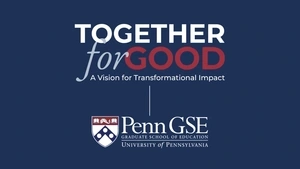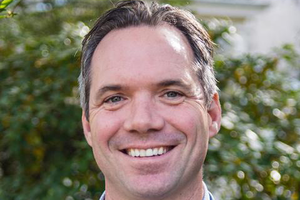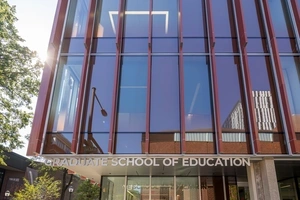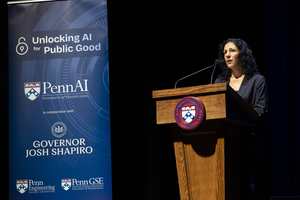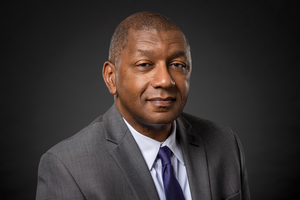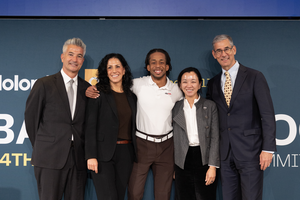We must reimagine education together.
Together for Good frames the vital work that Penn GSE will undertake in the years ahead. This vision is aligned with the goals articulated in the University of Pennsylvania’s strategic framework, In Principle and Practice. Because no single institution or sector can meet and make this moment alone, our vision is built on deep collaboration—not only with educators but also with policymakers, industry leaders, philanthropists, and communities around the world. And it draws on the distinctive research and programmatic strengths that have long distinguished Penn GSE as a premier school of education. Together with our partners, Penn GSE is shaping a future for education that uplifts every learner and transforms society for good.
Our Vision
Penn GSE will lead the world in producing consequential research and preparing learners to be impactful educational practitioners, scholars, and changemakers who work with communities worldwide to define profound possibilities, address complex challenges, and secure education as the bedrock of democracy.

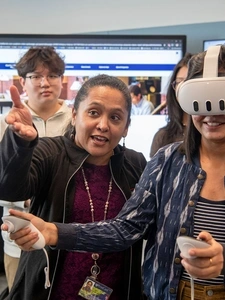
Imagining Education's Future
Together for Good reflects extensive and collaborative deliberation from the Penn GSE community, including faculty, staff, students, alumni, board members, university leaders, and community partners. It was shaped through hundreds of conversations with community members, centered upon a fundamental belief that education is essential to transforming society for the better. We asked one key question: What do we want to be true of education in ten years? While we recognize that Penn GSE alone cannot bring about all the change we seek, we are dedicated to leveraging our full strength—through influential research, transformative programs, and strategic partnerships—to achieve this future.
Four Strategic Priorities
Our vision embraces four strategic priorities that build on Penn GSE’s strengths spanning rigorous scholarship, high-quality instruction, innovative practice, and enduring community partnerships. These priorities are deeply interconnected, reinforcing one another to create a unified and comprehensive approach to transforming education.



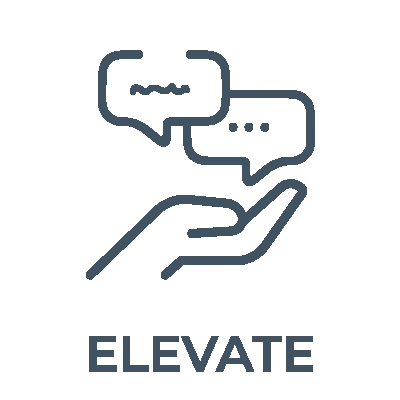
For decades, Penn GSE has prepared exceptional teachers, managers, counselors, and leaders, many of whom have gone on to shape transformative educational practices worldwide. The need for high-quality teachers and leaders is more urgent today than ever. Research shows that fewer people today are choosing the education profession even as burnout rates have reached an all-time high. Across the nation and here in Philadelphia, teacher and leadership shortages are severely impacting students’ ability to thrive. We will expand our efforts to create a resilient, diverse educator workforce that reflects the communities it serves and has access to affordable, career-spanning professional learning.
- Offer high-quality programs that evolve to address the real-time needs of educators, leaders, and counselors at multiple stages across their careers. We will enhance existing and develop new research-informed degree and nondegree programs to become a “one-stop-shop” for lifelong career development and support. We will foster humane learning environments, center socioemotional learning, and provide ample mental health resources to learners and educators alike. We will create networked learning communities in collaboration with schools, districts, governments, and industry partners to address pressing problems of practice. Our programs will equip students with skills applicable to learning settings in the U.S. and around the world.
- Make Penn GSE’s degree and non-degree programs more accessible to more people. We will dramatically reduce the cost of our teacher and leader preparation programs and enhance our contribution to developing an engaged educator pipeline. We will increase timely, career-spanning support by making our nondegree professional learning more affordable to our own graduates and other educators, especially those working in our home city of Philadelphia. Because accessibility is about more than cost, we also will continue to innovate on program structures and models to make a Penn GSE education more feasible for working professionals.
- Advocate for necessary policy changes here in Philadelphia, statewide, across the region, nationally, and around the globe. We will develop an evidence-based advocacy agenda to support programs and policies that have been shown to strengthen the vibrancy of, and representation within, the educational workforce. Through engagement with local, state, federal, and international governments, Penn GSE will elevate our research, increasing evidence-based decision-making in policy and legislation that affects educational labor markets and the success of educational practitioners.
Penn GSE’s faculty, staff, and students partner extensively with local communities, across the region, throughout the nation, and in 60 countries worldwide. These deep and longstanding partnerships, whether with schools in nearby West Philadelphia or educational leaders in Kazakhstan, reflect our duty to support Penn’s mission of being “anchored” in the community, committed to local neighborliness and global citizenship. We must work in open and trusting partnership with communities and draw on the expertise of our partners to address pressing, real-world problems. This approach moves beyond the traditional, top-down view of “we’re from the University, and we’re here to help” and instead embraces a collaborative “with” mindset to meet the needs of communities, as expressed by these communities.
- Deepen our longstanding relationship with Philadelphia’s public schools. We commit to establishing a plan to address the needs identified by our local public school partners in both research and programs. This planning requires that we begin by listening to and understanding the specific needs of the School District of Philadelphia and other local partners. We will then map those needs to Penn GSE and external resources to realize progress. Crucially, we must identify approaches to institutionalize key efforts and ensure their long-term sustainability. We can then apply the lessons of practice to our partnerships with other school districts regionally and beyond. Together, we will create a national model for collaboration between school districts and higher education.
- Change the national conversation on community-engaged scholarship. Community-engaged scholarship comprises research and creative work that is conducted in collaboration with community members, addressing real-world issues and generating knowledge that is mutually beneficial. Higher education institutions often undervalue such scholarship when evaluating faculty. Penn GSE will establish clear, supportive structures for faculty who engage in community-engaged scholarship, ensuring that their work is viewed as essential and evaluated fairly. We will also promote and encourage research initiatives that engage community members as active collaborators. Doing so is not only ethically right but also the pathway to the most rigorous and relevant research findings. Penn GSE will become a national model for embedding CES into the heart of scholarly work.
- Expand our global engagement. We will craft and implement a new plan to coordinate our international engagement, identify regional outreach priorities, and extend the school’s reach in ways aligned to global goals for sustainable development. We will enhance global partnerships, both existing and emerging, through dynamic collaboration with governments, international universities, nongovernmental organizations, and private-sector companies. We will deepen institutional support for faculty-led community-engaged work abroad.
- Broaden the reach, impact, and accessibility of Penn GSE scholarship. Much academic scholarship ends up behind paywalls in peer-reviewed journals. This makes the research inaccessible to the public, to decision-makers who can apply it to policy and practice, and to the communities that helped create it. We will translate our research findings into formats that our community partners, practitioners, and policymakers deem most helpful. We will develop policy briefs, research-based toolkits, and open-access digital platforms that can drive policy decisions, shape public discourse, and empower educational practitioners to act. Partnerships with governments and organizations in the United States and across the globe will ensure that our scholarship can serve the needs of those in positions to create systemic change and shape education policy frameworks everywhere.
Penn GSE is an inventive place. We prize innovation in our scholarship, our practice, our programs, and our pedagogy. However, at Penn GSE, innovation means not only doing what is new but also doing what is needed. Our faculty, staff, students, and alumni have long been recognized as global leaders in bridging the gap between theory and practice to drive real-world change. With that foundation, we will expand the boundaries of knowledge and practice in ways that meet the ever-evolving needs of learners, educators, and their communities.
- Conduct groundbreaking, practitioner-informed educational research that addresses the great challenges of our time, including education’s role in confronting barriers to equal access, threats to democratic values worldwide, and the promises and perils of rapid technological advances. Addressing these challenges requires us to engage researchers of diverse backgrounds, methodologies, and disciplines and collaborate with the practitioners and communities most affected by those challenges. Through new funding opportunities and enhanced research infrastructure, we will empower faculty and students to produce research that not only identifies problems but also offers scalable solutions. In doing so, we will conduct work that provides the foundation for transforming educational systems and social structures toward a better future for all.
- Cultivate an intellectual community where interdisciplinarity is the norm, not the exception. Education research is an inherently interdisciplinary enterprise, evidenced by our faculty’s contributions to fields like psychology, statistics, social work, and healthcare. We will uplift the methodological breadth of our quantitative and qualitative scholarship, and we will foster, fund, and sustain interdisciplinary research centers and cross-pollinating projects that bring together scholars, practitioners, and graduate and doctoral students across the University. These initiatives break down silos, encourage knowledge exchange, and promote a comprehensive understanding of educational phenomena. Our commitment to interdisciplinarity extends to cross-sector collaborations, engaging with fields such as healthcare, economics, and technology. These partnerships will broaden the scope and impact of our research, addressing complex, multifaceted challenges.
- Prepare educators, leaders, scholars, and other stakeholders to shape, embrace, and use novel technologies and practices. We will deploy emerging technologies to enhance teaching and learning experiences, creating personalized learning pathways and increasing access to high-quality educational resources. We will embrace artificial intelligence as a tool that—when carefully managed and thoughtfully deployed—can support educators’ practice and improve student learning. We do so while acknowledging the need to ensure technology does not deepen existing barriers to access but instead bridges gaps, providing solutions that reach all learners, particularly those from communities in need.
Education is the foundation of any robust and thriving society, and it assumes a particularly powerful role within democracies. A healthy democratic society relies on its members’ ability to openly express ideas, critically analyze arguments, and find shared humanity with those who are different from themselves. Educational institutions have a profound ethical duty to prepare students to engage productively in a democratic society, especially within civic participation and democratic discourse. The need for such discourse, and the acrimony, distrust, and disengagement that result from its absence, are defining challenges of our time.
- Enhance our own approaches to challenging, productive conversations within Penn GSE. Penn GSE will model the kind of productive discourse we seek to promote throughout the world. We will implement professional development programs for Penn GSE faculty and staff on engaging in and facilitating hard conversations, managing conflicts, and promoting practices that incorporate a wide range of perspectives, experiences, and backgrounds. We will embed these practices into program curricula and host programs and events that engage our whole community in this work.
- Build capacity for discourse that promotes democratic values University-wide. As citizens of the University of Pennsylvania, we will also expand partnerships across the University with peer schools and centers such as the SNF Paideia Program to develop and facilitate programming for Penn students and faculty beyond Penn GSE. In doing so, we will work to position Penn as a leader in fostering productive dialogue across difference, setting a national standard for how institutions of higher learning can serve as sites for democratic discourse and develop students’ capabilities for the productive exchange of ideas.
- Equip our own students as well as partners, community leaders, and the wider public with tools to encourage critical thinking, open dialogue, and civic engagement. We will refine, facilitate, and share models for engaging in difficult conversations and honing other key skills of democratic participation in learning settings. We will promote our faculty’s research that explores the intersections of education, democracy, and truth. We will create programs to empower educators, leaders, and other stakeholders to have—and to embolden others to have—hard conversations, influencing decisions at institutional, system, state, and federal levels.
See Our Vision In Action
Here, we convene an ambitious and varying community of leaders and pioneers, connecting them to one another and to a world that will benefit from their work.
Related News
Contact Us
To learn more about the School's strategic vision and how you can support the path forward for Penn GSE, please contact us.
Janice Rafferty Grady
Vice Dean for Development and Alumni Relations
